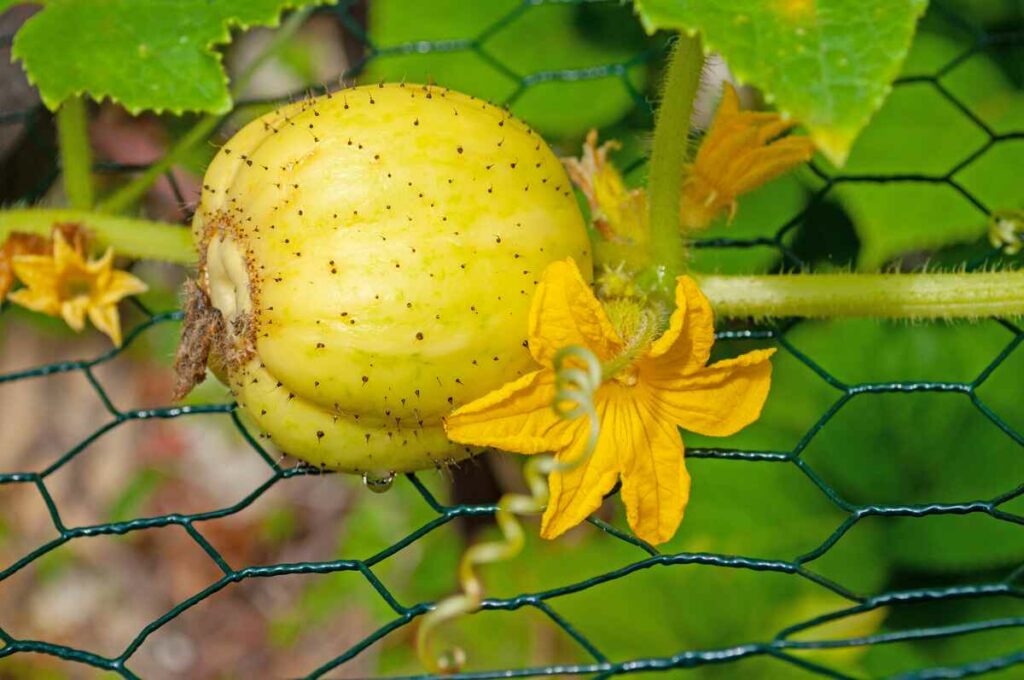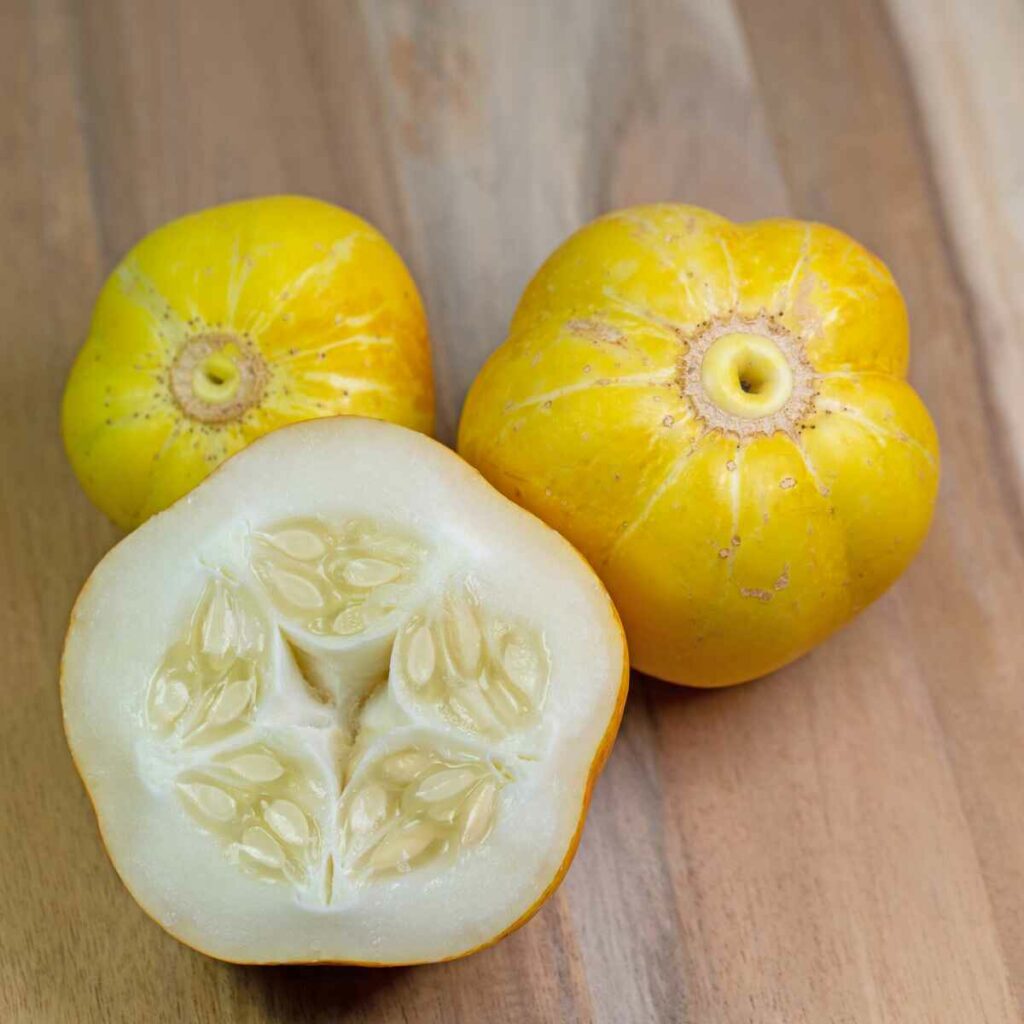Add variety to your garden by learning to grow lemon cucumbers.
These round, yellow cucumbers have a mild and sweet flavor that’s perfect for salads, pickling, and snacking. Not only are they tasty, but they are also easy to care for and can be harvested in just 60 days.
To ensure a successful harvest, lemon cucumbers require specific planting and soil needs. They are heavy feeders and thrive in rich, well-drained soil. Proper watering and fertilizing are also crucial for their growth and development. Additionally, pests can be a challenge, but with the right pest control measures in place, you can protect your lemon cucumber plants and enjoy a bountiful harvest.
In this article, we will provide you with tips and tricks on how to grow and care for your own sweet and easy lemon cucumbers.

Grow Lemon Cucumber Takeaways
- Lemon cucumbers require rich, well-drained soil and at least 6-8 hours of sunlight per day.
- They are heavy feeders and should be fertilized every two weeks with an all-purpose fertilizer.
- Lemon cucumbers are easy to grow and tend to require less heat to ripen than some other cucumber varieties.
- Pest control for lemon cucumbers includes using insecticidal soap for aphids and spider mites, and manually removing cucumber beetles.
Planting and Soil Needs
If you want to grow healthy lemon cucumbers, you should ensure they’re planted in well-drained, nutrient-rich soil and receive at least six to eight hours of sunlight per day.
Lemon cucumbers are heavy feeders and require a soil pH of 6.5 to 7.0 (neutral). Adding compost with phosphorous or mixing in a low nitrogen 5-10-10 fertilizer before planting can provide the necessary nutrients for healthy growth.
You can also try companion planting to help improve soil quality and deter pests. Planting marigolds, basil, or dill near your lemon cucumbers can help repel harmful insects and attract beneficial ones.
Lemon cucumbers are ready to harvest as soon as 60 days after planting and can be stored in a cool, dry place for up to two weeks. To keep them fresh longer, try pickling them or eat them right away by adding them to salads for a refreshing crunch.

Watering and Fertilizing
To keep your lemon cucumber plants healthy and productive, make sure to water them at the base and fertilize with an all-purpose fertilizer every two weeks. Lemon cucumbers are heavy feeders and require consistent watering to thrive.
Watering them at the base helps to prevent foliage diseases, and giving them one inch of water per week will keep the soil evenly moist. Additionally, fertilizing every two weeks with an all-purpose fertilizer will provide the necessary nutrients for the plants to produce healthy fruit.
Mulching benefits the plants in many ways, including keeping the roots cool, retaining moisture, providing pest protection, and preventing the fruits from lying directly on the soil. Adding a layer of organic mulch to the soil around the plants will also help to suppress weeds and reduce the need for frequent watering.
Starting seedlings indoors is also a good way to ensure healthy and productive plants. Use a variety of containers to start the seeds, and make sure to harden off the seedlings before transplanting them outside.
By following these tips and tricks, you can enjoy a bountiful harvest of sweet and easy-to-grow lemon cucumbers.
| Fertilizer | Benefits |
|---|---|
| All-purpose fertilizer | Provides necessary nutrients for plant growth |
| Low nitrogen 5-10-10 fertilizer | Mix in before planting to promote root growth |
| Compost with phosphorous | Add before planting to promote flowering and fruiting |
| Mulch | Benefits |
|---|---|
| Organic mulch | Keeps roots cool and retains moisture |
| Provides pest protection | Prevents fruit from lying directly on soil |
| Suppresses weeds | Reduces the need for frequent watering |
Pest Control
Protect your lemon cucumber plants from pests like aphids, spider mites, and cucumber beetles by regularly inspecting the plants, removing any eggs or adults, and using insecticidal soap. These pests can cause damage to your plants and reduce your harvest, but there are natural remedies that can help prevent infestations.
One effective method is to use companion planting, which involves planting certain herbs and flowers near your cucumber plants to repel pests. Examples include planting marigolds, nasturtiums, and basil around your lemon cucumbers.
Another natural remedy is to use neem oil, which is a plant-based insecticide that is safe for both plants and humans. Simply mix a small amount of neem oil with water and spray it on your plants regularly to keep pests at bay.
Additionally, make sure to keep your garden clean and free of debris, as this can attract pests and encourage infestations. By taking these preventative measures, you can ensure a healthy and bountiful harvest of sweet and easy lemon cucumbers.

Frequently Asked Questions About Growing Lemon Cucumbers
Can lemon cucumbers be grown in containers?
Yes, lemon cucumbers can be grown in containers, as long as you provide optimal conditions to support their growth. Container gardening is a great option for those with limited garden space or who prefer to control the soil and growing conditions.
When growing lemon cucumbers in containers, it’s important to choose a container that is large enough to accommodate the plant’s root system and to ensure proper drainage. Optimal conditions for container-grown lemon cucumbers include using a nutrient-rich potting soil, providing at least six to eight hours of sunlight per day, and maintaining a slightly acidic soil pH of 6.5 to 7.0.
Additionally, be sure to water regularly to keep the soil evenly moist, and provide support for the vines as they grow. With the right care, your lemon cucumber plants can thrive in a container garden.
How often should lemon cucumber plants be pruned?
To ensure healthy and fruitful lemon cucumber plants, pruning is an important part of their care. Pruning frequency and techniques may vary depending on the size and growth of the plant, but generally, it’s recommended to prune once a week.
By removing the lateral shoots and dead leaves, you can encourage air circulation, prevent overcrowding, and redirect the plant’s energy towards fruit production. Benefits of pruning include better quality and quantity of cucumbers, increased resistance to diseases and pests, and easier maintenance.
However, excessive pruning can also have a negative impact on plant growth, so it’s important to balance between removing the right amount of foliage and not overdoing it.
Can lemon cucumbers be grown in partial shade?
If you’re wondering whether lemon cucumbers can be grown in partial shade, the answer is yes, but there are benefits to growing them in full sun.
Lemon cucumbers need at least six to eight hours of sunlight per day to thrive and produce an abundant harvest. However, if you live in an area with hot summers, partial shade can help protect the plants from the intense afternoon sun and reduce heat stress.
Keep in mind that growing lemon cucumbers in partial shade may result in slower growth and smaller fruits. Additionally, planting companion plants like beans and peas can help provide shade and nitrogen to the soil, which can benefit the growth of your lemon cucumbers.
At what temperature do lemon cucumber seeds germinate?
To ensure successful germination of lemon cucumber seeds, it’s important to provide optimal soil conditions and follow best practices for seed storage.
Lemon cucumber seeds require warm soil with a temperature of at least 65 degrees Fahrenheit.
It’s recommended to start seedlings indoors two to four weeks before the last frost date and sow seeds directly in the soil after all danger of frost has passed.
To store seeds, keep them in a cool, dry place and away from moisture and sunlight.
Before planting, make sure to add compost with phosphorous or mix in a low nitrogen 5-10-10 fertilizer to provide the necessary nutrients for the seeds to grow.
Keep the soil evenly moist while seeds are germinating and provide one inch of water per week to maintain moisture.
Follow these best practices for optimal germination of lemon cucumber seeds.
How many lemon cucumbers can be expected from one plant?
If you’re wondering how many lemon cucumbers you can expect to get from one plant, it’s important to consider a few factors. Lemon cucumbers are naturally prolific and can produce quite a large yield. However, the number of cucumbers you can expect from one plant depends on factors like growing conditions, the variety of lemon cucumber, and harvesting techniques.
With proper care, you can expect to harvest anywhere from 8-12 cucumbers per plant. These cucumbers are mild and sweet, with a cool, crispy texture that makes them ideal for salads and pickling. They taste similar to green oblong varieties and are usually less bitter.
With their many culinary uses, lemon cucumbers are a great addition to any vegetable garden.
Ready to Grow Lemon Cucumbers?
You now know how to grow lemon cucumbers and how to care for the plants. With the right soil, watering, and fertilizing techniques, you can enjoy a bountiful harvest in just two months.
Remember to plant your lemon cucumber seeds in rich, well-drained soil and keep the area consistently moist. Fertilize regularly with a balanced fertilizer and keep an eye out for common pests like aphids and cucumber beetles.
If you follow these tips and tricks, you’ll be well on your way to enjoying the delicious, mild flavor of lemon cucumbers in your salads and pickling jars. So go ahead and give it a try – you’ll be amazed at how easy it is to grow your own fresh produce!
Happy gardening!